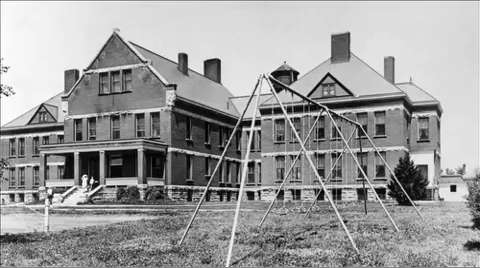Descendants on path of peace in Canton

Hiawatha Asylum for Insane Indians: The old building is gone, but a cemetery still is on the grounds of the Hiawatha Asylum for Insane Indians in Canton, today Hiawatha Golf Course. Hear people talk about needed improvements.
By Steve Young
May 5, 2013
CANTON — It is a long way to travel to mingle with the dead in a graveyard on a golf course at the east edge of Canton.
But Faith O’Neil and Anne Gregory come anyway, from California and Oregon, lured irresistibly by the echoes of their own ancestral past.
Long ago, long before it was transformed into the Hiawatha Golf Club, something much more dark and troubling resided where the fairways and greens lie today. Back then, at the turn of the 1900s and for the next 30 years, it was called the Hiawatha Insane Asylum and was the nation’s only such institution for Native Americans.
O’Neil and Gregory had grandmothers who were sent there. When they return now, the two women come looking for the spirits of those relatives, hoping for some supernatural revelation about what their lives were like in that place, and wanting to discern the often bitter truth about how they died.
The conversations, they say, can bring them to tears.
“Even though I didn’t know her in the physical world, I know her spiritually,” O’Neil said of her grandmother, Elizabeth Fairbault, who gave birth to O’Neil’s mother Sept. 8, 1926, at the asylum. “She’s with me at Hiawatha when I go there; I can sense her. And I’m bound and determined to find out what happened to her.”
A loose-knit group formed in the past seven to eight months shares that curiosity. Called the Hiawatha Indian Insane Asylum Action Committee, their members include Native Americans such as Bill Bird and George Eagleman, who work at the nearby Keystone Treatment Center in Canton; Yankton Sioux artist Jerry Fogg; and Lavanah Judah, who lives in Yankton and can count 15 relatives by blood and marriage who spent time at the asylum.
The committee is composed of white members, too, such as Lisa Alden, Canton’s Chamber of Commerce director, who said a history of abuse and neglect at the asylum brings her to tears. And Donna Dexter of Sioux Falls, whose search for the namesake of her hometown of Floodwood in northern Minnesota eventually led her to Canton and the tragic tale of asylum patient Tom Floodwood.
Read more at ArgusLeader.com
